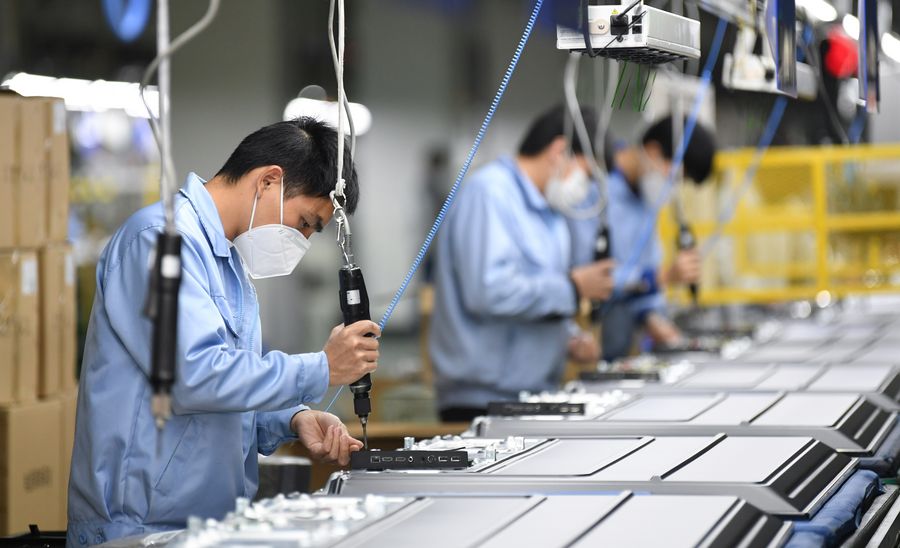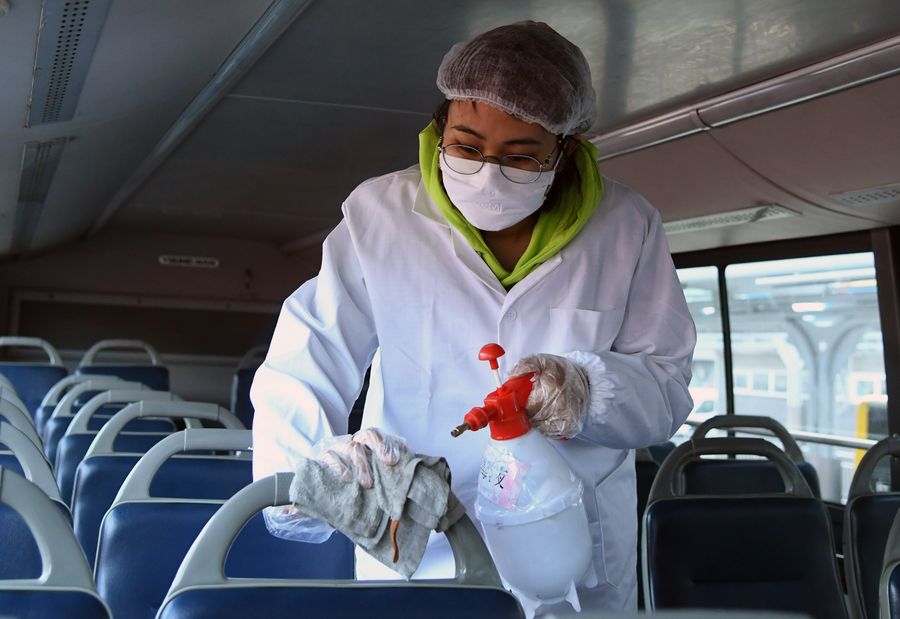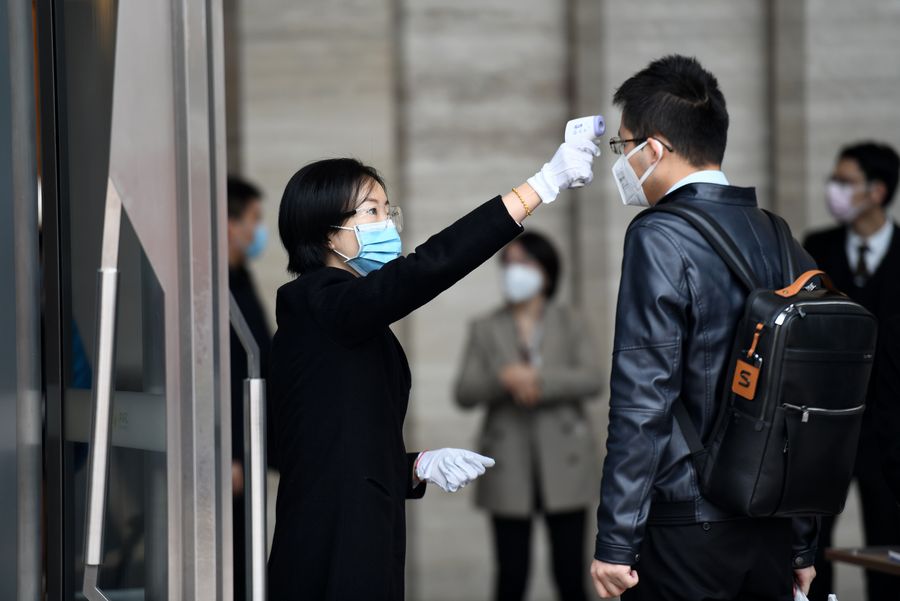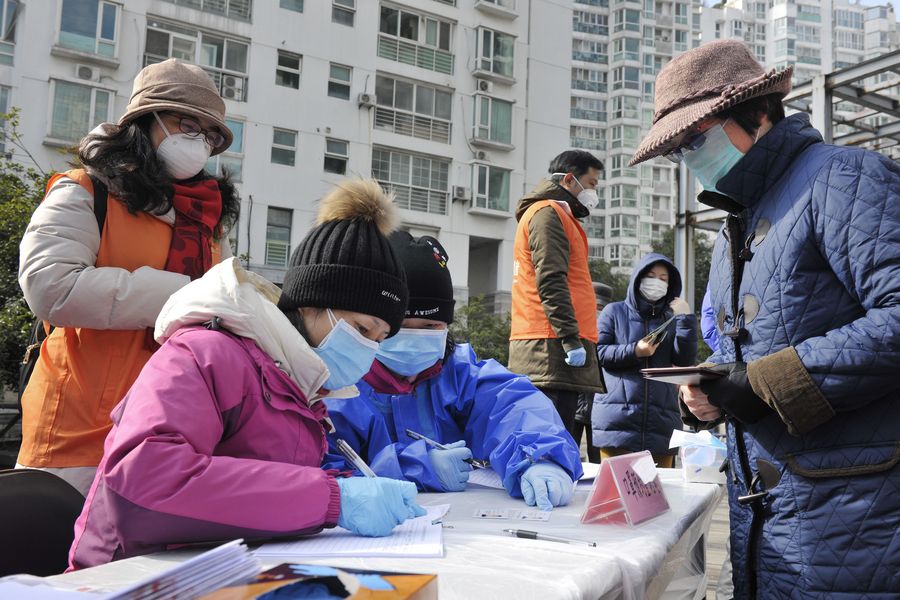Epidemic prevention measures have been intensified at venues with crowded people across the country, as more people are about to resume work after a prolonged holiday.
As of Monday, more than 7,000 enterprises in China's high-tech hub Zhongguancun had resumed work, and about 2,100 enterprises had restarted operation in the Beijing Economic-Technological Development Area.
In Shanghai, the latest official survey showed that over 80 percent of software and information service enterprises in the city have returned to work, and more than 70 percent of their employees have chosen to work from home.
By Xinhua writers Ma Yujie, Ma Xiaoran
BEIJING, Feb. 11 (Xinhua) -- Monday marks the first working day for the majority of businesses in China, which has been plagued by the novel coronavirus outbreak and extended the Spring Festival holiday -- originally scheduled to end on Jan. 30 -- to control the spread of the virus.
"I left home more than 10 days in advance to get back to work in time," said Wu Shaosong, a safety inspector at a plant under Galanz Group, a leading household electrical appliances manufacturer headquartered in Shunde, south China's Guangdong Province.
Before heading back, Wu and his colleagues had been trained in epidemic prevention through WeChat to help them better protect themselves at work.
Wu left his hometown in the neighboring Guangxi Zhuang Autonomous Region, and drove back to Shunde on Jan. 29, almost two weeks before the plant resumed production.
"I immediately contacted the local community committee and began self-quarantine after I got back," said Wu.
On Feb. 10, about 70 percent of the group's over 5,000 Shunde-based employees had returned to work. The company requires regular disinfection at the plant and all employees to wear masks and take their body temperature every four hours.
"Workers at the production lines must have their temperature taken every two hours," said Wu. The company also temporarily closed its canteen and prepared boxed meals instead.

Staff members work at a workshop of Skyworth in Guangzhou, south China's Guangdong Province, Feb. 10, 2020. (Xinhua/Deng Hua)
In a circular released over the weekend, the State Council, or China's cabinet, urged efforts to protect workers from getting infected while resuming production as soon as possible.
Despite risks of further infection, ensuring nationwide work resumption is a crucial part of China's efforts against the ongoing novel coronavirus outbreak, Cong Liang, secretary-general of the National Development and Reform Commission (NDRC), said at a press conference Tuesday.

A staff member disinfects a bus handrail at a bus station in Beijing, capital of China, Feb. 3, 2020. (Xinhua/Ren Chao)
INTENSIFIED MEASURES
Epidemic prevention measures have been intensified at venues with crowded people across the country, as more people are about to resume work after a prolonged holiday.
"I had my temperature taken 18 times and registered my personal information five times on my way back," said Ma Guanpu, who took the train from Mudanjiang in northeast China's Heilongjiang Province to Beijing over a distance of about 1,400 km.
Beijing subway and bus operators on Monday said they would increase the departure frequency of buses and subway trains, limit passenger numbers during rush hours and enhance disinfection to curb the novel coronavirus pneumonia outbreak.
The capital city has been conducting daily disinfection and body temperature checks of passengers in 23 subways lines covering 405 stations. Passengers with fever will be immediately isolated and taken to hospital for further diagnosis.

A staff member measures temperature of people entering Ping'an International Financial Center in Shenzhen, south China's Guangdong Province, Feb. 10, 2020. (Xinhua/Liang Xu)
Shanghai has also beefed up prevention measures by enforcing full coverage of information registration and temperature taking for people entering the city, and residential communities are required to enhance management, with all persons and vehicles coming in and out to be registered.
CAUTIOUSLY OPTIMISTIC
As of Monday, more than 7,000 enterprises in China's high-tech hub Zhongguancun had resumed work, and about 2,100 enterprises had restarted operation in the Beijing Economic-Technological Development Area.
In Shanghai, the latest official survey showed that over 80 percent of software and information service enterprises in the city have returned to work, and more than 70 percent of their employees have chosen to work from home.
The Tesla Shanghai gigafactory and its supplier also resumed operation on Monday. According to Tao Lin, Tesla's global vice president, the scheduled delivery of vehicles in early February will be postponed and Tesla would "try its best to make up for the suspension when the epidemic takes a turn for the better."
Tesla CFO Zachary Kirkhorn said the temporary shutdown may slightly impact the company's profitability for Q1 2020 but the impact is "limited" as the profit contribution from the Model 3 in Shanghai remains in the early stages.

Staff members record residents' reservation information of masks inside a residential area of east China's Shanghai, Feb. 2, 2020. (Xinhua/Gao Feng)
"We're still understaffed," said Zhang Shuai, a testing operator of CT scanners in Philips Healthcare (Suzhou) Co., Ltd. in east China's Jiangsu Province. "Most of the returned workers are from within the province as long-distance bus service is still restricted in some places."
"About 350 workers of our 1,300 employees in Suzhou have returned to work as of Feb. 10," said Kent Cheng, plant manager of the company. "The majority are engineers and workers on the production lines of medical equipment that are necessary for outbreak control. We encourage others to work at home until Feb. 17."
"There will be two possible consequences for us if the contagion continues. One is that our sales volume will significantly surge due to the high demand for medical equipment," said Cheng. "But if someone in the company gets infected, all of us will have to be isolated and our production will have to be paused. That may also happen to our suppliers, which could also hinder our production."
Despite the epidemic, Cheng is still bullish on the prosperity of the Chinese market.
"China is our most important market. If we get past this outbreak in March and April, we still expect growth in revenue this year. China has a huge market potential for medical equipment and we are very confident in our future development in China," said Cheng.
(Meng Yingru, Zhu Xiao, He Leijing, Qin Huajiang, Xu Xiaoqing, Zhou Rui, Zhou Qiang, Gai Boming, Xie Hao, Qiu Yi, Ding Jing, and Ji Ning, Yang Youzong, He Xinrong also contributed to the story.)
(Video reporters: Lin Kai, Wang Pu, Gai Boming, Li Jiarui, Zhang Chao, Huang Guobao, Wang Pan, Zhou Rui, Ding Ting, Luo Xuefeng, Liang Xu, Li Sijia, Dai Wei, Sun Qing, Pan Xu, Zhang Mengjie, Guo Jingdan, Tang Wen; Video editor: Zhu Cong)■



